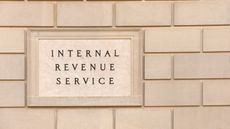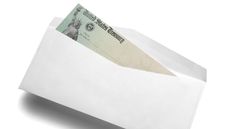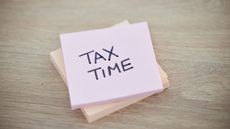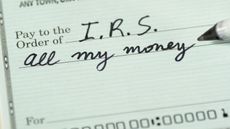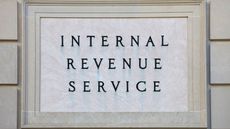New Jersey State Tax Guide
State tax rates and rules for income, sales, property, fuel, cigarette, and other taxes that impact New Jersey residents.
- (opens in new tab)
- (opens in new tab)
- (opens in new tab)
- Newsletter sign up Newsletter

Bottom Line
Middle-Class Families: Least Tax-Friendly (Go to the Kiplinger Tax Map for Middle-Class Families)
Retirees: Least Tax-Friendly (Go to the Kiplinger Tax Map for Retirees)
While New Jersey gives many residents a break on income and sales taxes, it brings the hammer down when they buy a home. New Jersey's statewide median property tax rate is the highest in the country.

Sign up for Kiplinger’s Free E-Newsletters
Profit and prosper with the best of expert advice on investing, taxes, retirement, personal finance and more - straight to your e-mail.
Profit and prosper with the best of expert advice - straight to your e-mail.
Income taxes in New Jersey on middle-class taxpayers are low, but the state has a steeply progressive rate structure – and a "millionaire's tax" – that kicks the income tax burden up for wealthier residents. The state has also made some efforts to reduce the income tax burden on retirees, with a generous exemption for retirement income and a complete exemption for Social Security benefits.
Sales taxes in New Jersey are below average. But it's not enough to overcome the state's crushing property taxes. Plus, even though New Jersey recently eliminated its estate tax, the state still imposes an inheritance tax.
New Jersey Income Taxes
New Jersey Income Tax Range
Low: 1.4% (on up to $20,000 of taxable income)
High: 10.75% (on taxable income over $1 million)
Newark also imposes a payroll tax.
New Jersey Taxation of Social Security Benefits
Social Security benefits are not taxed by the state.
New Jersey Tax Breaks for Other Retirement Income
Taxpayers age 62 or older with New Jersey income of $150,000 or less can exclude some or all of their income from a pension, annuity, IRA, or other retirement plan. For taxpayers with gross income of $100,000 or less, the maximum exclusion is $100,000 for joint filers, $75,000 for single filers, and $50,000 for married taxpayers filing a separate return. For taxpayers with gross income between $100,001 and $125,000, the maximum exclusion is 50% of retirement income for joint filers, 37.5% of retirement income for single filers, and 25% of retirement income for married taxpayers filing a separate return. For taxpayers with gross income between $125,001 and $150,000, the maximum exclusion is 25% of retirement income for joint filers, 18.75% of retirement income for single filers, and 12.5% of retirement income for married taxpayers filing a separate return. (Note: Taxpayers who did not claim the maximum pension exclusion amount may be able to use the unclaimed amount to exclude other types of income (e.g., wages, interest, dividends, etc.) on their New Jersey tax return.)
Taxpayers who are otherwise eligible for Social Security or Railroad Retirement benefits, but will never be able to receive those benefits because their employer did not participate in either program, may qualify for a special exclusion of $6,000 (joint filers, head-of-household filers, and qualifying widow(er)s) or $3,000 (single filers and married taxpayers filing separately).
Military pensions and Railroad Retirement benefits are fully exempt.
New Jersey Sales Tax
6.625% state levy. That rate is cut in half (3.3125%) for in-person sales in designated Urban Enterprise Zones located in disadvantaged areas. Salem County, which borders no-tax Delaware, also charges the reduced 3.3125% rate. As a result, the average rate in the state is 6.6%, according to the Tax Foundation.
- Groceries: Exempt
- Clothing: Exempt
- Motor Vehicles: Taxable (6.625% throughout state)
- Prescription Drugs: Exempt
New Jersey Real Property Taxes
In New Jersey, the median property tax rate is $2,257 per $100,000 of assessed home value.
New Jersey Property Tax Breaks for Retirees
Homeowners age 65 or older can claim either a deduction or refundable credit on their New Jersey income tax return for property taxes paid for a primary resident in New Jersey. The deduction is equal to property taxes paid (or 18% of rent), up to $15,000. The credit is for $50.
The Property Tax Reimbursement Program, also known as the "senior freeze," reimburses eligible senior citizens for property tax increases. The amount reimbursed is the difference between the amount of property taxes that were due and paid in the first year that the homeowner met all of the eligibility requirements and the amount due and paid in the current year for which the homeowner is claiming the reimbursement, provided the amount paid in the current year is greater. All of the eligibility requirements must be met for the base year and each succeeding year to qualify for the reimbursement. Among the requirements: You must be 65 or older, have lived in New Jersey for at least the past ten years and not have income exceeding certain limits for the previous two years. (For 2020 and 2021, the income limits are $92,969 and $94,178, respectively.)
A $250 tax deduction from property taxes is also available to a homeowner age 65 or older or permanently and totally disabled, or the unmarried surviving spouse (55 or older) of such a person. To qualify, annual household income cannot exceed $10,000. This benefit is administered by the local municipality.
New Jersey Motor Fuel Taxes
Gasoline: 41.4¢ per gallon.
Diesel: 48.4¢ per gallon.
New Jersey Sin Taxes
Cigarettes: $2.70 per pack
Moist snuff: $0.75 per ounce
Other tobacco products: 30% of the wholesale price
Vapor products: $0.10 per ml for closed containers; bulk nicotine liquid is taxed at 10% of retail price
Beer: $0.12 per gallon
Wine: $0.88 per gallon
Liquor: $5.50 per gallon
Marijuana: Sales tax applies to marijuana sales; local taxes of up to 2% may also apply
New Jersey Estate and Inheritance Taxes
New Jersey imposes an inheritance tax on inherited property with a value of $500 or more. No tax is imposed on transfers to the decedent's spouse, domestic partner, parents, grandparents, children and their descendants, or step-children (step-grandchild and their descendants are not exempt). The first $25,000 of property inherited by a decedent's sibling, son-in-law or daughter-in-law is also exempt. After that, they must pay the inheritance tax at rates ranging from 11% to 16%. All other individual heirs pay a 15% tax on the first $700,000 of inherited property and a 16% tax on everything over $700,000.
Rocky Mengle was a Senior Tax Editor for Kiplinger from October 2018 to January 2023 with more than 20 years of experience covering federal and state tax developments. Before coming to Kiplinger, Rocky worked for Wolters Kluwer Tax & Accounting, and Kleinrock Publishing, where he provided breaking news and guidance for CPAs, tax attorneys, and other tax professionals. He has also been quoted as an expert by USA Today, Forbes, U.S. News & World Report, Reuters, Accounting Today, and other media outlets. Rocky holds a law degree from the University of Connecticut and a B.A. in History from Salisbury University.
-
-
 IRS Service Improvements Could Bring Faster Tax Refunds
IRS Service Improvements Could Bring Faster Tax RefundsRecent IRS improvements mean taxpayers could see faster tax refunds next year and beyond.
By Katelyn Washington • Published
-
 For Best Tax Savings, Year-Round Tax Planning Is Essential
For Best Tax Savings, Year-Round Tax Planning Is EssentialFor optimal, ongoing tax reduction, consider employing these nine strategies throughout the entire year.
By Andy Leung, Private Wealth Adviser • Published
-
 How to Lower Your Tax Bill Next Year
How to Lower Your Tax Bill Next YearKnowing how to lower your tax bill (pay less taxes) when it's time to file your return next year requires some strategizing through the rest of 2023. Here are some tax tips to help make it happen.
By Katelyn Washington • Published
-
 Indiana Storm Victims Have an Extended IRS Tax Deadline
Indiana Storm Victims Have an Extended IRS Tax DeadlineIndiana taxpayers impacted by recent severe storms have an extension of the April 18 deadline to file federal tax returns.
By Katelyn Washington • Published
-
 IRS Says File Soon for $1.5 Billion in Unclaimed Tax Refunds
IRS Says File Soon for $1.5 Billion in Unclaimed Tax RefundsUnclaimed tax refunds from 2019 are waiting for millions of people who might not know it – but only if they file the pandemic-era tax return soon. Are you one of them?
By Kelley R. Taylor • Published
-
 Tax Tips for Last-Minute Filers
Tax Tips for Last-Minute FilersTime has run out for most people to file taxes for 2022, but these tax tips could help you file soon after the tax deadline and possibly keep more money in your pocket at the same time.
By Katelyn Washington • Published
-
 How to Pay the IRS if You Owe Taxes
How to Pay the IRS if You Owe TaxesThere are several ways to pay the IRS if you owe taxes, but just because you can pay your tax bill over time doesn’t always mean you should.
By Katelyn Washington • Published
-
 Who is Required to File a Tax Return, and Who Isn't
Who is Required to File a Tax Return, and Who Isn'tIf you meet certain income requirements, you are required to file a federal tax return (or get an extension) by Tax Day. You could face penalties if you don't.
By Katelyn Washington • Published
-
 California Tax Deadline Extension: What You Need to Know
California Tax Deadline Extension: What You Need to KnowSome Californians have more time to file federal and state tax returns because of natural disasters.
By Kelley R. Taylor • Published
-
 IRS Says Some Stimulus Check Recipients Should File an Amended Tax Return
IRS Says Some Stimulus Check Recipients Should File an Amended Tax ReturnSome early filers who received state "stimulus" payments may need to file an amended tax return to possibly get a refund.
By Kelley R. Taylor • Last updated
